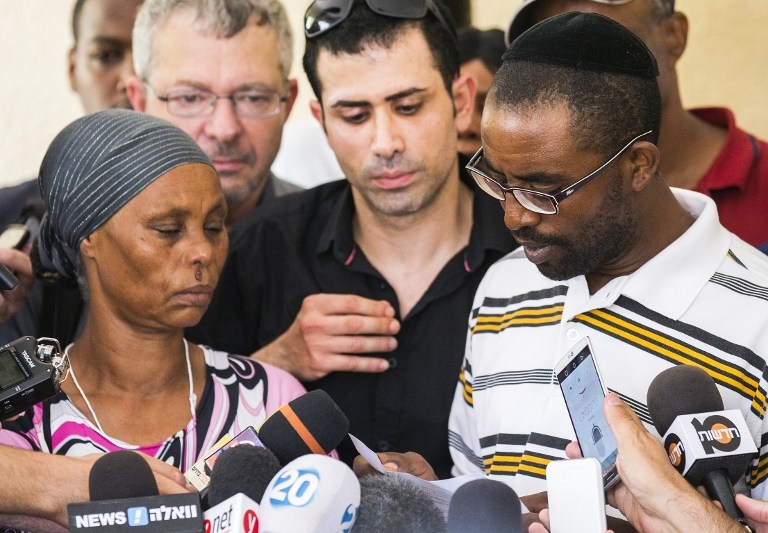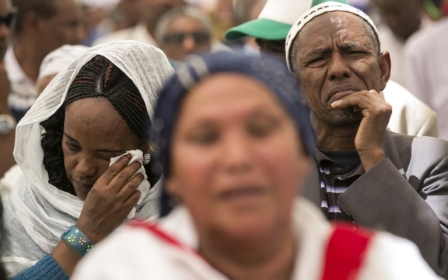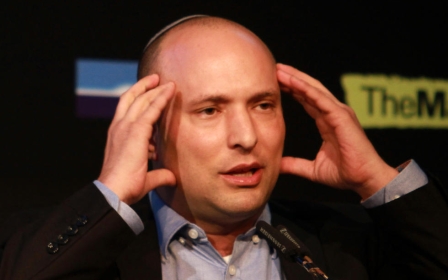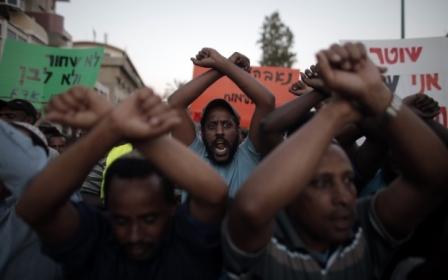Israel accused of racism over case of Ethiopian Jew missing in Gaza

The belated admission by Israel that one of its citizens was last seen entering Gaza 10 months ago, and that little is known of his fate since, has caused outrage among the country’s small community of Ethiopian Jews.
Avraham Mengistu’s family, able to speak for the first time on Thursday after a gag order imposed since September was lifted, accused the government and security forces of foot-dragging and racism.
The assumption among Israeli authorities is that the 28-year-old has been detained by Hamas in Gaza since he went missing.
Officials confirmed at the same time that another Israeli civilian, a Bedouin man from the Negev who has yet to be identified, had crossed the fence enclosing Gaza in April.
Mengistu’s family said he was “unwell”. A military source told the media Mengistu had been exempted from the army draft years earlier because of mental health issues.
At a hastily convened press conference in Mengistu’s home town of Ashkelon, a few kilometres north of Gaza, the family suggested that they had been told to keep quiet to avoid placing the government under pressure to negotiate with Hamas.
“We will no longer remain silent," said one of Mengistu’s brothers, Yalu, on Thursday. “There will be rallies and demonstrations, there will be media coverage and especially, we will be talking. They will hear us. We have lost confidence in the country and it seems like it does not care about our brother.”
Complaints of discrimination
The Ethiopian community has long complained of racism and police brutality.
But tensions have been especially high since the spring, when Ethiopian youths clashed repeatedly with police in protests in Tel Aviv. The demonstrations were triggered by a video of an Ethiopian in an Israeli army uniform being beaten by police in what appeared to be an unprovoked attack.
“The Ethiopian community knows well that there is racism towards it in most areas of life,” Efrat Yerday, an Ethiopian activist and blogger, told MEE. “This latest incident simply underlines that in a very graphic way.
“Were it any other Israeli in Gaza apart from an Ethiopian and a Bedouin, the matter would not have been swept under the carpet. There has been a complete blackout for nearly a year.”
Anger from the Ethiopian community was also fuelled by a recording broadcast on Channel 10 TV of Lior Lotan, Prime Minister Benjamin Netanyahu’s envoy, meeting the Mengistus shortly before the gag was lifted.
Lotan is heard angrily rebuking the family and making threats that, if they criticise Netanyahu, it will “cause [Mengistu] to stay in Gaza for another year”.
A defence ministry official on Friday told the AFP news agency that Lotan had apologised for "both the tone and content of the conversation".
Mehereta Baruch-Ron, an Ethiopian deputy to the mayor of Tel Aviv, said Lotan’s behaviour typified how officials “patronise” the Ethiopian community.
“We are seen as people who are quiet and accepting of whatever is thrown at us,” she told MEE. “But the situation is changing fast, as the recent protests prove. People want change.”
Continuing uncertainty
Israeli officials have defended the use of a gag on the media, saying it was necessary while they tried to determine Mengistu’s status and work on a strategy for extracting him from the tiny enclave.
But the continuing uncertainty after so many months has only added to the family’s anger. “I’m one million percent sure if he was white, we wouldn’t be in this situation,” Yalu Mengistu told reporters.
The comment appeared to be a reference to the difference in the Israeli authorities’ handling of Mengistu’s case and that of Israeli soldier Gilad Shalit.
Shalit was captured in 2006 and held prisoner by Hamas in Gaza for five years. Israel was reported to have scoured Gaza for signs of Shalit, while a massive campaign of support for him soon swept Israel. Banners and billboards featuring Shalit’s face were plastered on street corners.
The pressure eventually forced the government to agree a prisoner swap in 2011 that freed more than 1,000 Palestinian detainees. Security officials have made it a priority to ensure that such prisoner swaps do not occur again.
In stark contrast to the general clamour over Shalit, only a few members of the Ethiopian community were aware until Thursday that Mengistu had entered Gaza.
The extent of the blackout was underscored by the number of senior officials who said they knew nothing about Mengistu until the gag was lifted, including Avigdor Lieberman, the foreign minister until May’s general election.
Tzachi Hanegbi, the head of the parliament’s defence committee, told Israeli radio: "You'd be surprised, I had no idea.”
Ignorance ‘astounding’
Pnina Tamano-Shata, an Ethiopian legislator until the recent election, told MEE the level of ignorance among senior officials was “astounding”.
She said she had been helping the family since they emailed her last year. “I couldn’t believe that what they were telling me was true but when I discovered it was I couldn’t believe no one else was talking about it.”
She said she had informed 10 senior members of the parliament herself. “None of them did anything.”
Mengistu’s condition is unclear, as is whether he is still in Gaza.
Although Israel accuses Hamas of holding him prisoner, some Hamas officials have said he was released soon after he arrived in Gaza, when it became clear he was not a soldier.
Mengistu is reported to have entered Gaza in early September, climbing over the usually tightly controlled perimeter fence days after the end of Operation Protective Edge, Israel’s attack on the enclave last summer.
Other Hamas officials have suggested that he later left Gaza through one of the tunnels into Egypt, apparently in an effort to reach Ethiopia.
But Hamas political leader Khaled Meshaal indicated on Thursday that the group might be holding him. He said there would be no talks about the two men until Israel released 70 Hamas members arrested and jailed by Israel last summer.
He added that Israel had also been trying to negotiate through European mediators the return of the bodies of two soldiers killed in Gaza last summer.
Family rebuffed
Prime minister Benjamin Netanyahu said on Thursday that he had told Mengistu’s parents “that since the moment we were informed of the incident, we have done everything we can to bring him back to Israel.”
The family, however, disagreed. They said it took the Israeli army two weeks to brief them about his disappearance back in September, and that attempts to meet government officials, including Netanyahu, had been repeatedly rebuffed.
The father of the missing Bedouin man said he too had been kept in the dark. “I have no idea where my son is, nobody told me he’s in Gaza and I don’t know if he’s there or not,” he told the Haaretz daily.
Mengistu’s father Ayele told Channel 10 that the army had broken their promise to take care of Mengistu in return for the family’s silence. “They didn’t do anything,” he said.
Yerday said Ethiopian community leaders had learnt that Mengistu was in Gaza shortly after he went missing, but had been forced to keep quiet.
“We tried to raise attention through social media but we had to be careful about saying too much because of the censorship rules,” Yerday said. “It is dangerous to speak out in Israel on issues that have been declared a security matter.”
In protest, many Ethiopian activists had replaced their social media profile pictures with a black background and Mengistu’s name in white letters. Others had been wearing T-shirts, including at recent demonstrations, bearing Mengistu’s name followed by a question mark.
Israel’s 130,000 Ethiopians make up slightly less than two percent of the population. The older generation were brought to Israel under the Law of Return in a series of airlifts beginning in the 1980s, but their Jewishness has been questioned by a number of rabbis and is still doubted by some Israelis.
President apologises
At a ceremony in Jerusalem in May commemorating Ethiopians who lost their lives trying to reach Israel - hundreds are estimated to have died making the journey from Ethiopia to the camps in Sudan from where the airlifts took place - President Reuven Rivlin apologised for the poor treatment of the community. He said: “We didn’t see, we didn’t act correctly and we did not listen enough.”
Ethiopian activists, however, say there is little sign of a change in official attitudes.
Ortal, who was involved in the recent protests but did not want to give her full name, said the community was shocked that police responded to the demonstrations with stun grenades, tear gas and water cannon. Such crowd control equipment is more familiar from crackdowns on protests by Palestinian citizens.
“The examples of racism and discrimination have been going on for more than 30 years and I don’t see change happening,” she said. “Maybe our parents who were new to the country were prepared to accept this treatment, but the young people will no longer stay quiet.”
Official figures show Ethiopians face widespread discrimination in jobs, housing and education, while poverty rates are similar to those faced by Israel’s Palestinian minority.
In 2010 it emerged that a controversial long-term birth control injection was being administered to many Ethiopian women, apparently as a way to control their fertility.
Blood donations from Ethiopians are also routinely discarded or refused for fear donors may be carriers of HIV and other diseases.
At May’s commemoration ceremony, Netanyahu promised to root out such attitudes: “We will turn racism into something contemptible and despicable. There are societies that have succeeded in rising above this filth.”
New MEE newsletter: Jerusalem Dispatch
Sign up to get the latest insights and analysis on Israel-Palestine, alongside Turkey Unpacked and other MEE newsletters
Middle East Eye delivers independent and unrivalled coverage and analysis of the Middle East, North Africa and beyond. To learn more about republishing this content and the associated fees, please fill out this form. More about MEE can be found here.




